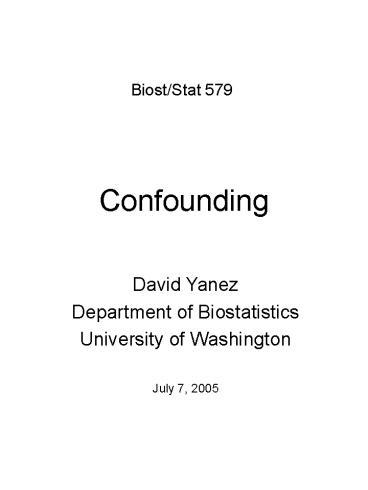Confounding PowerPoint PPT Presentation
1 / 20
Title: Confounding
1
Confounding
Biost/Stat 579
David Yanez Department of Biostatistics University
of Washington July 7, 2005
2
Information Bias
- Measurement Errors
- Non-differential
- Error in assessing exposure or disease is similar
between study groups - Measure of effect tends toward 1
- Differential
- Error in assessing exposure (or disease) differs
in different study groups - May increase or decrease measure of effect
3
Information Bias
- Non-differential Misclassification
- Hypothetical Case-Control study
4
Information Bias
- Differential Misclassification
- Hypothetical Case-Control study
5
Confounding
The Idea Confounding is a confusion of
effects. Definition The apparent effect of the
exposure of interest is distorted because the
effect of an extraneous factor is mistaken for or
mixed with the actual exposure effect.
6
Confounding
- Properties of a Confounder
- A confounder, C, must be causally related to the
outcome, Y, OR associated with some predictor
that is causally related to Y. - C must be associated with the predictor of
interest, X, in the source population. - C must not be affected by X or Y.
- The confounder cannot be an intermediate step in
the causal path between X and Y.
7
Confounding
- Sources of confounding
- Randomized clinical trials
- Random differences between groups
- Randomized clinical trials reduce confounding
effect by balancing known and unknown confounding
factors - Observational Studies
- Random differences between groups
- Factors associated with the exposure of interest
8
ConfoundingCausal Diagram
Confounder
Causal
Predictor
Outcome
Confounder
Predictor
Outcome
9
Country of Residence and Mortality
Country Mortality (per 1000)
Costa Rica 3.8
Venezuela 4.4
Mexico 4.9
Canada 7.3
U.S. 8.7
10
Confounding
Ecologic study to determine whether country of
residence is associated with mortality.
Age
Country
Mortality
Average age may be different among countries.
Causal
11
Country of Residence and Age-Adjusted Mortality
Country Adjusted Mortality (per 1000)
Costa Rica 3.7
Venezuela 4.6
Mexico 5.0
Canada 3.2
U.S. 3.6
12
Confounding
Case-control study to determine whether vitamin C
intake is associated with colon cancer.
13
Confounding
- Design
- Restriction
- Matching
- Individual matching
- Group matching
- Randomization
- Analysis
- Stratified analysis
- Adjustment
- Age-adjustment
- Regression analysis
14
Confounding
- Detection
- Biologic model or underlying theory should allow
you to specify potential confounders in advance
of study/analysis - Assess for confounding in a systematic way
- Known of potential confounding factors
- Other factors not previously known to be
confounding factor
15
Stratified Analysis
16
Confounding
ORc ad/bc ORa f(OR1, OR2), Mantel Haenszel
procedure If ORc ORa no evidence of
confounding If ORc ? ORa, evidence
of confounding
17
Stratified Analysis
18
(No Transcript)
19
Stratified Analysis
20
Confounding
- Analytic Criteria for Confounding
- The crude estimate of effect differs from the
adjusted estimate of effect - Steps to assess confounding
- Calculate crude measure of effect (means, reg.
Coeff., RR, OR) - Stratify and calculate stratum-specific measures
of effect, or - Fit regression that adjusts for the potential
confounders - Examine whether effects are similar.
- Statistical significance should not be used as a
criterion for assessing confounding.

